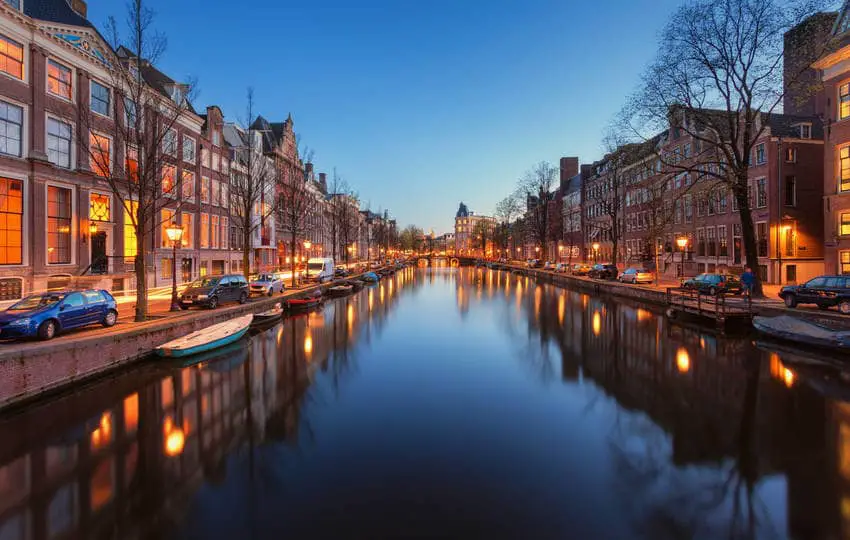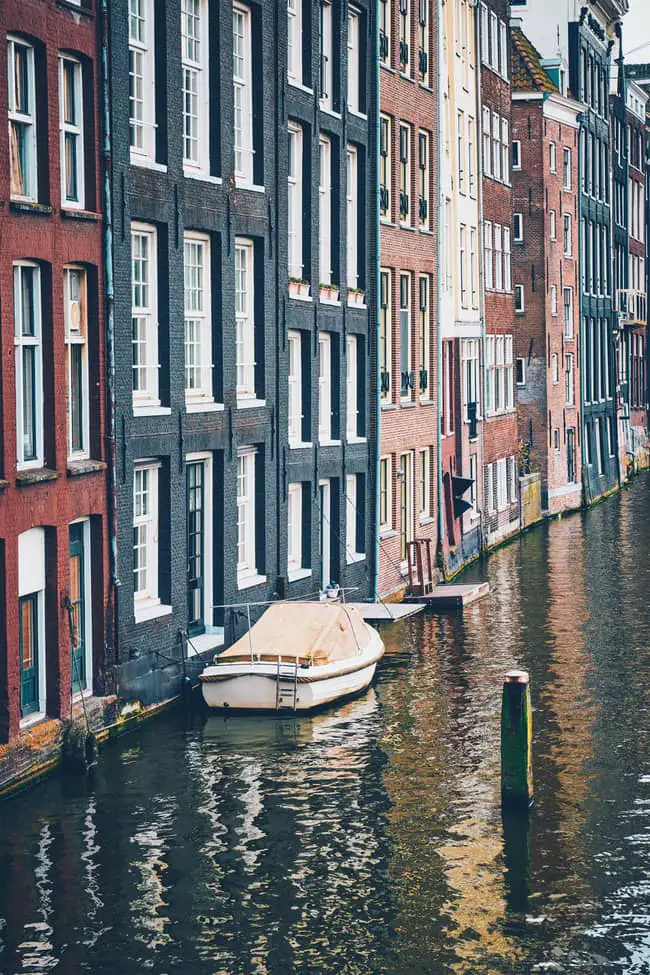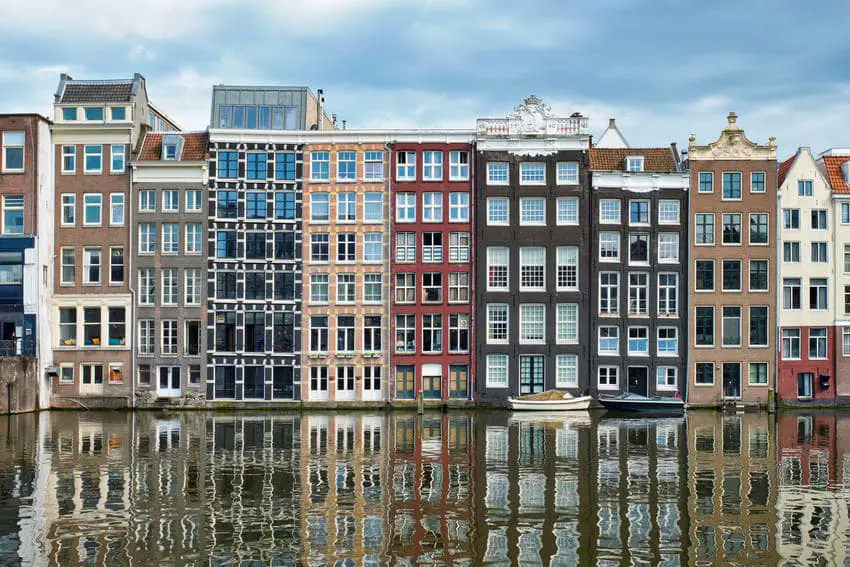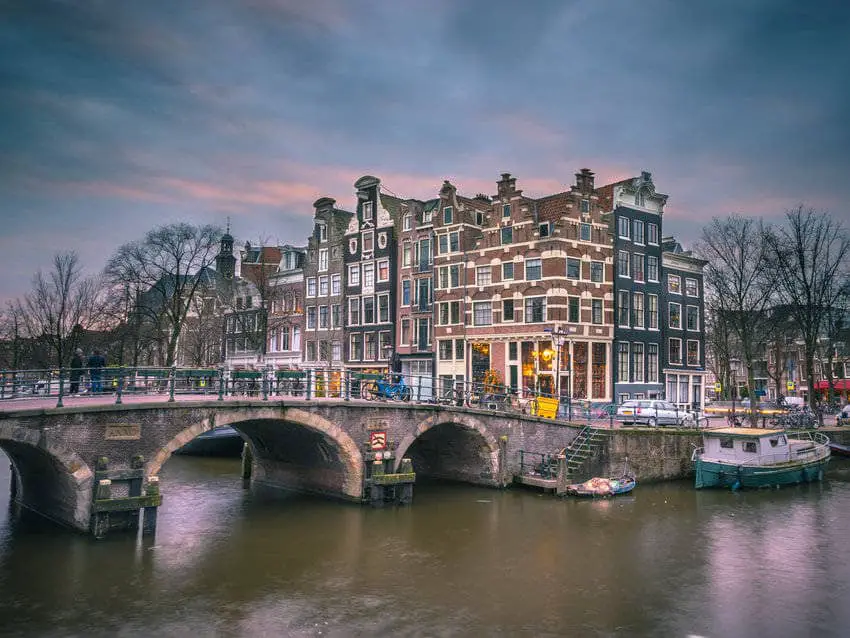With over 160 canals, Amsterdam is known as the Venice of the North. It is one of the cities in the Netherlands with the highest amount of water and the whole city is built around the canals, considered to be a UNESCO World Heritage Place. Anyone would wonder, doesn’t it smell bad having so much water inside a city, next to your home or working place?
No, canals in Amsterdam don’t smell bad. All canals are connected together and they get their water from different rivers, including the river Amstel and the river IJ. To this, we have to add the high amount of rain all these canals receive and we have fresh, odorless water all year round.

How is it possible that so much water inside a city doesn’t smell? Is there enough rain and enough flow rate during the summer? Does it ever smell bad even though they are connected? Well, you will know once you have experienced it and could see how Amsterdam is all year round. If you want to know more about these canals and how the quality of the water is, keep reading!
Amsterdam: the Venice of the North
Unlike in Venice, Amsterdam water never ever smells like anything. Why is this? Well, the whole reason why Venice sometimes smells, it is because there is not enough water movement and that leads to water stagnation. This occurs only during the hottest months though. In the case of Amsterdam, even during the hottest months, there are enough water movements due to the connection between the Rhin river and its affluents with the sea and them passing through all the canals in Amsterdam.
Amsterdam and Venice are very similar cities due to their geographic location: both of them are constructed on top of the water, have canals that work to communicate most parts of the old city and are connected to the sea. What makes them different?
Where Does the Water in Amsterdam Come from?
Well, first of all, not all the canals in Venice smell just a little and not all the time. Venice canals smell like the sea with low water would smell like salt, a little fishy and like any port or beach where the water hasn’t flow for a while. When during the summer the heat makes the canals have less water, some smaller canals with not very good flow, those may smell. However, most canals in Amsterdam are properly connected to the bigger canals, which are connected to rivers, affluents and the sea, meaning they have a constant good flow rate.

Besides, in Venice, the water smells a little salty and it reminds you of the sea, which is the biggest source of water flow in the area. However, in Amsterdam, the highest percentage of water in the canals is freshwater that can easily be purified for human consumption.
There are many sources that fill up the canals in Amsterdam and the amount coming from each of them varies depending on the season. The three main ones are:
- The Sea (Northern Sea connected to the Atlantic)
- Big rivers and its affluents (mostly the Rhine river and the Amstel river)
- The Rain (with an average yearly rainfall of 700 millimetres)
As everybody knows, Amsterdam (and in general, the whole Netherlands) is one of the places in Europe where it rains the most. Rain is certainly one of the main sources of water that provides the flow rate with enough amount of water to circulate and never be stagnant and stinky. Rain is also one of the main sources that contribute to the flow rate in rivers and affluents. Besides, rain provides freshwater which is added to the canals and can be easily purified for human consumption and agricultural purposes.
Rivers and their affluents are definitely another main source for water supply: the river Rijn (or the Rhine) is one of the main rivers that provide the canals with fresh water. Its origin is in Switzerland and it has been the main source of water for many countries for centuries. This river has many affluents, including the river Amstel and many other secondary ones that reach Amsterdam and create a delta that has developed into many canals connected to the sea. Rivers and canals are technically the main sources of freshwater in the Netherlands. This is the water used for the taps in all the homes in the whole country, including irrigation for agriculture and livestock, etc.

So, how does this make the water odourless and pure? Well, it is technically odourless but not that pure, in other words, not ready for human consumption, because it is also in contact with salty water coming from the sea.
As most people know, Amsterdam is a city connected directly with the Northern Sea by the Noordzeekanaal ( or Canal of the Northern Sea). In the Central Station and the whole port of Amsterdam, the water is connected to the coast. Throughout the years, the water has created an estuary where salty and sweet water mixes up.
Therefore, to the main water sources, we also have to add the Ijmuiden and the Ij river, the main feature close to Amsterdam Centraal, where you can cross to Noord, go for a cruise, and the main pass for ships, water sports, etc.
To sum up, NO, canals in Amsterdam don’t really smell due to the high amount of water flow they have every single day in all the canals, making it impossible for water to stagnant. Besides, smells are more common in a warm and humid environment, and whereas in Amsterdam you can definitely feel the humidity, there are very very few days in the year where you can feel the warmth, apparently, not enough to make the canals smell.
Do Amsterdam Canals Smell? Personal Experience
I have lived in Amsterdam for a couple of years and besides perceiving certain new smells in the air, it is very unlikely to smell the canals. This is something I have never considered because I have never perceived it. It is true that maybe there are many more mosquitoes because of the humidity during the warmest months, but I have never perceived any smell.

For those of you thinking about it, yes, you can smell the weed in the air. But there are so many other big European cities where I have smelt it just as much or even more than it is not something I would highlight of my Amsterdam experience. Recently I read an article of the Guardian about “the sweet smell of Amsterdam” where they talk about the lack of cannabis smell in the city. Well, it may depend on the day and who you run into, right?
I would say that one of the things that surprised me the most when I moved to the Netherlands, coming from living in the south of Spain, is the lack of smell. I travelled here for the first time in July, one of the warmest months of summer in Spain, and one of the more smelly ones in my opinion. When I arrived in Amsterdam, neither the airport, neither the people neither the air smell like anything at all.
I remember talking about this with my Dutch friends and them confessing to me that during spring, if you go to the greener areas of the country, you can smell the strong fertilisers they use for the fields, mostly for tulips. In any case, nothing that has ever called my attention, and I am a picky person when it comes to smells.
How Is It Like to Have a Canal House?
I have never read or heard of any boathouse owner complaining about the smell or the location of the house. These houses are some of the most expensive ones, starting from 45k to 250k. Therefore, I would say if people would have many complaints nobody would want to own a house like that, right?
However, I must add that recently while writing an article about freshwater in Amsterdam, I discovered that a lot of these boathouses wastewater goes directly to the canals. This apparently is not enough to contaminate and make this water impure, since it may be a very low percentage of it and maybe not all the residues go there, but it is a good explanation why the water in the canals is not 100% freshwater.
Inside the canals, there are also thousands of bicycles that make the water reaches in iron (read with irony) and other residues that end up inevitably here. This does not contribute either to the smell of the canals, yet it is good to know just to avoid having many ideas about swimming there and doing other recreative activities involving contact with the water.
Moreover, yes, you can drink tap water in Amsterdam (read more about it here) and no, water doesn’t really smell like anything, nor in the canals, nor in the tap nor in the shower.